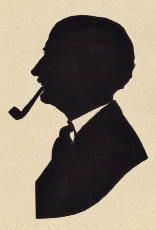Nicklaus Thomas-Symonds’s study of Clement Attlee is a specimen of that now relatively rare but still far from endangered species, the ‘political’ biography.
Nicklaus Thomas-Symonds’s study of Clement Attlee is a specimen of that now relatively rare but still far from endangered species, the ‘political’ biography. It pays scant attention to anything except Attlee’s political career, and rigorously eschews any prying into whatever dark corners there may have been in his private life. Some may think that no politician’s career can fully be understood unless it is viewed in the context of what was going on in his domestic setting. Usually this is a point of view I would defend. In the case of Attlee, however, it must be admitted that there almost certainly were no dark corners to explore. So little that was even faintly surprising seems to have been going on in the Attlee home that the reader loses nothing by its neglect. ‘An empty taxi arrived at 10 Downing Street and Mr Attlee got out’ — the celebrated insult often ascribed to, but disowned by, Churchill contains a kernel of truth. Attlee as a personality was resolutely, almost triumphantly, negative: no amount of research into his psyche or hunting for seamy episodes will throw much extra light on what is all too well lit already.
This book, says Thomas-Symonds, is ‘principally a study of Attlee’s leadership style’. Attlee’s approach to leadership, the author argues, was
an authentic reflection of his personality, experiences and background. He was a moderate, sensible, well-grounded man with few insecurities; he did not adopt a persona to project an image. He was the antithesis of a charismatic leader.
He was also the least interventionist of prime ministers, his preoccupation being to pick ministers in whom he had confidence and then to leave them to get on with the job. If some of the people he chose proved not to be up to it, then he was ruthless in dismissing them: otherwise he only interfered — and then reluctantly — if some conflict between two of them could not otherwise be resolved.
The system worked well, provided there were sufficient ministers of high calibre around to cope with the endless crises that afflicted post-war Britain. With Bevin and Cripps visibly crumbling, and Herbert Morrison spectacularly demonstrating his limitations when he took over from Bevin at the Foreign Office, Attlee enjoyed no such luxury. The weaknesses of his leadership style were made painfully apparent when Aneurin Bevan and Harold Wilson resigned in dudgeon in 1951. Attlee was right to back Gaitskell rather than Bevan, but a stronger and earlier intervention might have averted any such confrontation. ‘While Attlee cannot be held responsible for Bevan’s behaviour thereafter,’ writes Thomas-Symonds, ‘he can be held responsible for failing to find a compromise between the two men.’ The party he handed over to Gaitskell was in conspicuous disarray; in part at least this was his fault.
The most prominent biography of Attlee so far written — that by Kenneth Harris — was bland almost to the point of partiality. Thomas-Symonds is more astringent. He accuses Attlee of no major errors, but blames him repeatedly for what he did not do: failing to intervene personally over Kashmir, allowing Shinwell to cripple the national economy by his disastrous mis- management of coal supplies, taking a back seat while Britain drifted towards a suspension of convertibility — ‘his intervention was too late. He seemed to be losing his grip.’ Sometimes these criticisms are unfair: it is perhaps true that Attlee made little effort to understand Truman’s indignation over British attempts to curb Jewish immigration into Palestine, but at least — unlike Truman — he was prepared to admit there were Arab susceptibilities about the matter that needed to be taken into account. The suggestion he should have intervened personally in Kashmir when Mountbatten had failed to persuade the Maharajah to accede either to India or Pakistan is frankly absurd.
More often, however, the complaints seem justified. The Attlee who emerges from these pages is by no means a failure, but he is far from being the unflappable superman portrayed by Harris. The corrective is necessary and well-judged.
It must be admitted, though, that this biography will have only limited appeal. If the general reader is going to want to read this sort of book it must either contain significant new material or be exceptionally well written. Thomas-Symonds makes no pretence that he has made any sensational discoveries. He cites as original only papers relating to Attlee’s time at Haileybury (a subject dealt with in rather less than a page), and to his involvement with the Stepney Boys’ Club and the Indian Statutory Commission from 1927 to 1930 — interesting and informative, but not of the first importance. As to the style — it is at the best workmanlike and occasionally lumpen. This book is useful and generally fair but it is unlikely to attract many who do not already have a considerable interest in the period.






Comments